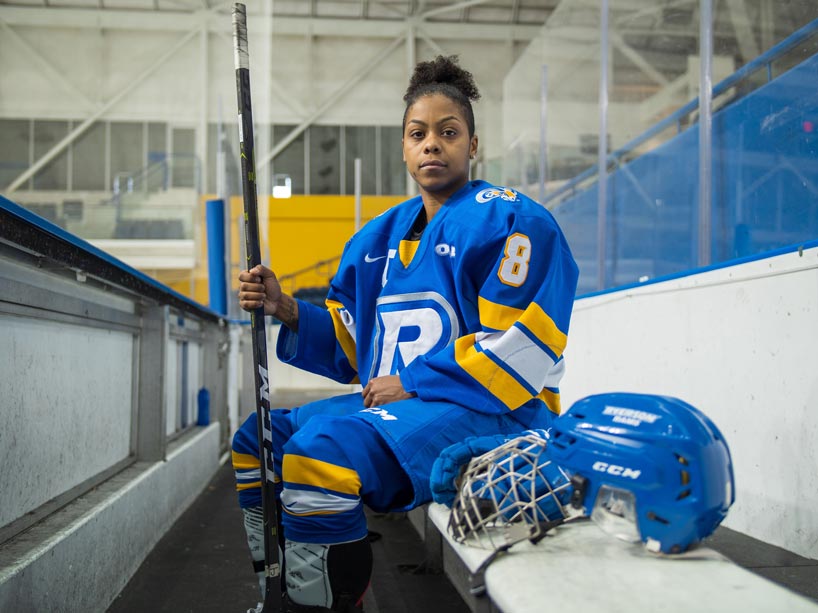Hockey captain ‘Krash’ Green breaking racial barriers in sport

Kryshanda ‘Krash’ Green at Ryerson’s Mattamy Athletic Centre and former Maple Leaf Gardens – where her grandfather once played. Photo credit: Nikita Ovsyannikov.
Kryshanda “Krash” Green remembers the day hockey changed for her forever.
She was 11.
Her team had just scored a goal in overtime to take the win, and she excitedly skated to centre ice to shake hands.
“I was first in the line, and the first three people on the opposing team, each of them called me the ‘N word’ as we were going through the handshake,” she said.
Shocked, Green – who grew up in Brampton, Ont., and was one of the few Black players in the Ontario Women’s Hockey Association (OWHA) league – fell out of the line and skated off the ice in a daze.
The moment had a lasting impact.
“It didn’t take anything from the sport for me, but it made me realize that I was different. I wasn’t just a kid playing hockey,” she said.
“I didn’t think about winning anymore. My first thought was, ‘What am I going to do if they call me that again? What’s my reaction going to be?’” she continued, noting that to this day before a game, “It’s the number one thing I think about.”
But she hasn’t let it defeat her.
Hear Kryshanda ‘Krash’ Green share her story about overcoming racism and becoming an inspiration to others. Producer: Lindsey Craig, Camera/Editor: Nikita Ovsyannikov.
‘What Krash has done…is remarkable’
Instead, with the support of her family – including her grandfather, Bill Riley, the third Black man to play in the NHL – Green has pushed racial boundaries and conquered them.
Today, the 26-year-old is not only still in the game – she’s a leader within it: Green is now in her fifth season on the Ryerson Rams women’s hockey team – and her second season as captain.
“What Krash has done with our program is remarkable,” said head coach Lisa Haley. “It’s the confidence that she has, not just in herself and her own abilities but also in those around her.”
Green, who’s graduating this spring with a degree in criminal justice and criminology, says her teammates are a big part of her success as well.
“The girls believe in me, they expect things from me…it keeps me working hard. They support me and encourage me to be the best I can be,” she said.
Playing in the Mattamy Athletic Centre (MAC) – former Maple Leaf Gardens – where her grandfather once played – is especially meaningful. So much so, Rogers Sportsnet featured Riley and Green in the Hometown Hockey segment, Home Team Heroes (external link) .
“The fact that my grandfather once played in this building, you know, he let me know he scored a goal here…it’s very inspiring but keeps me competitive to beat whatever he did,” she said with a grin.

Kryshanda ‘Krash’ Green says young, Black female players should believe in themselves and “keep pushing.” Photo credit: Nikita Ovsyannikov.
Representation is critical
Just as her grandfather inspired her, Green is now inspiring others.
“There’s a lot of Black fathers that come to the games and they usher their daughters down to take a picture with me, to show them, you know, that they can be captain too if they want,” she said.
Having that representation is critical, says sociology professor Nicole Neverson, who studies the socio-cultural aspects of sport and gender in Ryerson’s Faculty of Arts.
“When we’re able to see individuals who look like us in positions that we aspire to it helps to create a reality in our minds that the same could be possible for us,” she said, adding that it’s equally important for non-racialized people to see racialized people in these roles too.
She also points out that being the first racialized person in a particular position comes with added pressure.
“Being the first is incredible. It is historic. On the other hand… being the first can also be very lonely,” she explained.
Neverson also cautions that when minority groups break into certain positions in sport, many believe issues such as racism and sexism no longer exist.
“This is very problematic because one person in such a leadership role won’t change the broader culture,” she said, and notes that ensuring spaces in sport are inclusive, equitable, and anti-oppressive is a responsibility of non-racialized people as well.
‘You belong here’
Coach Haley says if there’s ever a team that can demonstrate progress in this regard, it’s Ryerson – one of the most ethnically diverse teams in the country.
“Our team is a great reflection of the city of Toronto and of Ryerson. We pride ourselves on our inclusivity and diversity. It doesn’t matter what colour your skin is or your orientation is, you belong here,” she said.
Green says she has hope for the future of hockey and gives advice to other young Black females in the game.
“Know that you are capable… always believe in yourself and keep pushing,” she said, adding that anyone who’s experienced a traumatic incident like she did shouldn’t go through it alone.
“Talk to people. Part of the reason I don’t think I really escaped worrying about what happened to me is I didn’t tell anybody. I wasn’t in the company of people where I expressed, ‘I’m really afraid of what’s going on’. So, if you have something on your mind, really express it and really talk about it. It will help you build your game,” she said.
February is Black History Month. For events at Ryerson, please visit https://www.torontomu.ca/equity/events-workshops/.
Related:





